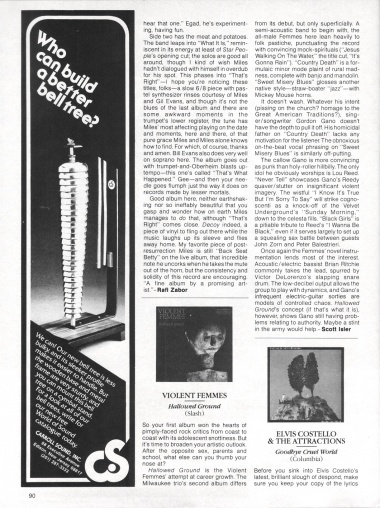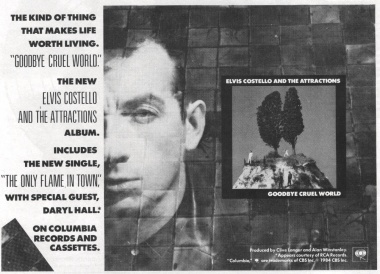Musician, August 1984: Difference between revisions
(+detail) |
(+tag) |
||
| (8 intermediate revisions by the same user not shown) | |||
| Line 1: | Line 1: | ||
{{Bibliography header}} | {{Bibliography header}} | ||
{{Bibliography index}} | {{:Bibliography index}} | ||
{{Musician index}} | {{:Musician index}} | ||
{{ | {{:US rock magazines index}} | ||
{{Bibliography article header}} | {{Bibliography article header}} | ||
<center><h3> Goodbye Cruel World </h3></center> | <center><h3> Goodbye Cruel World </h3></center> | ||
<center>''' Elvis Costello </center> | <center>''' Elvis Costello & The Attractions </center> | ||
---- | ---- | ||
<center> Fred Schruers </center> | <center> Fred Schruers </center> | ||
| Line 11: | Line 11: | ||
{{Bibliography text}} | {{Bibliography text}} | ||
Before you sink into Elvis Costello's latest, brilliant slough of despond, make sure you keep your copy of the lyrics (printed on the album sleeve). Without such help, Elvis' mumbles, lisps, slides and vocal serrations will be buried. With it, ''Goodbye Cruel World'' becomes a coherent if dense assemblage of global and sexual politics. Still, if this album were a few degrees more "mature," it would be inaccessible. | |||
When Elvis began tearing into modern manners seven years ago, he used a big beat and snarled his message in often elemental lyrics; even a song like "Watching The Detectives" ripped off skillful metaphors in an angry frenzy. Now his sedulous delivery masks a darker and angrier vision. Costello has become like Cary Grant in ''Notorious'', suave and a bit removed while the Nazis and temptresses swirl around him. | |||
"The Only Flame In Town" kicks off the album with a pealing, anachronistically stylized sax. ''"He struck a match and it lit up her face,"'' sings Elvis, dollying in, ''"We should have struck a match girl / To burn down the whole place."'' | |||
The love songs do not get sunnier. The disgruntled husband of "Home Truth" feels like a clown as Steve Nieve's piano obbligato gives way to whanging guitar; the cryptic events of "Room With No Number" hide under a fast-trotting beat and carnival noises. In "Worthless Thing" Costello figuratively pries open the tomb of the pop demigod whose first name he adopted, and he doesn't like what he finds — a Disgrace-land full of ''"grave robbers from Memphis, Tennessee / And Las Vegas body snatchers...."'' | |||
In "Joe Porterhouse," Costello's singing gives itself over completely to a liquid melody, a passivity that is most appropriate: typically, it's an evocation which stops just short of becoming a vignette. Bare details seem to weave around the death of an iconic prole. Summing up the punctilious bleakness of Costello's vision, the sun that beats down ''"...is cracking the flags."'' | |||
The album's closing three songs grow progressively overt in their political content. Amidst the metaphysical riddles of "The Great Unknown," Costello sets this droll onomatopoetic picture of a mob rub-out: ''"Footprints set in sentimental cement / Now burden down his bones."'' "The Deportees Club" is a slam-danceable xenophobic screed which ref uses to forgive the sins of Mussolini and Frank Sinatra: ''"In America the law is a piece of ass."'' On "Peace In Our Time," Elvis draws a connection between Margaret Thatcher and Ronald Reagan's geopolitical belligerency. ''"Just another tiny island invaded when he's got the whole world in his hands."'' Wartime Prime Minister Neville Chamberlain is evoked, newsreel-style — ''"he waved a piece of paper in the air..."'' to contrast with a slightly cynical view of Common Market fraternity (e.g., German disco and Italian shoes). Costello does his smoothest crooning of the album here, over acoustic guitars and distant horn fills. | |||
This is not a record made for hits — not what the B.B.C. used to call Light Entertainment. As we suspected from the very start, Costello has found his fecundity, and his ornery power, in dealing with the squandering of love and trust — whether by young lovers or old empires. Though this LP is bristly with subtle invention, he's not making major changes in style. There's no reason the magpie, working this close to the top of his form, has to turn into a chameleon. | |||
{{cx}} | |||
{{tags}}[[Goodbye Cruel World]] {{-}} [[Watching The Detectives]] {{-}} [[The Only Flame In Town]] {{-}} [[Home Truth]] {{-}} [[Steve Nieve]] {{-}} [[Room With No Number]] {{-}} [[Worthless Thing]] {{-}} [[Memphis, Tennessee]] {{-}} [[Joe Porterhouse]] {{-}} [[The Great Unknown]] {{-}} [[The Deportees Club]] {{-}} [[Frank Sinatra]] {{-}} [[Peace In Our Time]] {{-}} [[Margaret Thatcher]] {{-}} [[BBC]] {{-}} [[Fred Schruers]] | |||
{{cx}} | {{cx}} | ||
| Line 19: | Line 33: | ||
{{Bibliography notes}} | {{Bibliography notes}} | ||
{{Bibliography next | {{Bibliography next | ||
|prev = Musician, | |prev = Musician, July 1984 | ||
|next = Musician, October 1984 | |next = Musician, October 1984 | ||
}} | }} | ||
'''Musician, No. 70, August 1984 | '''Musician, No. 70, August 1984 | ||
| Line 26: | Line 40: | ||
[[Fred Schruers]] reviews ''[[Goodbye Cruel World]]''. | [[Fred Schruers]] reviews ''[[Goodbye Cruel World]]''. | ||
---- | ---- | ||
An ad for ''Goodbye Cruel World'' runs page [[:image:1984-08-00 Musician page 20.jpg|20]]. | |||
{{Bibliography images}} | {{Bibliography images}} | ||
[[image:1984-08-00 Musician | [[image:1984-08-00 Musician page 90.jpg|380px|border]] | ||
<br><small>Page scan.</small> | |||
<br><small> | |||
<small>Advertisement.</small><br> | |||
[[image:1984-08-00 Musician advertisement.jpg|380px|border]] | |||
<small>Cover and page scans.</small><br> | |||
[[image:1984-08-00 Musician cover.jpg|x120px|border]] | |||
[[image:1984-08-00 Musician page 20.jpg|x120px|border]] | |||
[[image:1984-08-00 Musician page 92.jpg|x120px|border]] | |||
{{Bibliography notes footer}} | {{Bibliography notes footer}} | ||
| Line 50: | Line 64: | ||
*[http://en.wikipedia.org/wiki/Musician_(magazine) Wikipedia: Musician magazine] | *[http://en.wikipedia.org/wiki/Musician_(magazine) Wikipedia: Musician magazine] | ||
{{DEFAULTSORT:Musician 1984-08-00}} | |||
[[Category:Bibliography 1984 | [[Category:Bibliography]] | ||
[[Category:Bibliography 1984]] | |||
[[Category:Musician| Musician 1984-08-00]] | [[Category:Musician| Musician 1984-08-00]] | ||
[[Category:Magazine articles | [[Category:Magazine articles]] | ||
[[Category:Album reviews | [[Category:Album reviews]] | ||
[[Category:Goodbye Cruel World reviews | [[Category:Goodbye Cruel World reviews]] | ||
Latest revision as of 02:44, 2 August 2019
|




